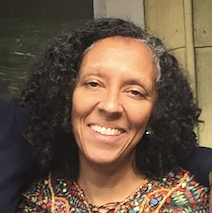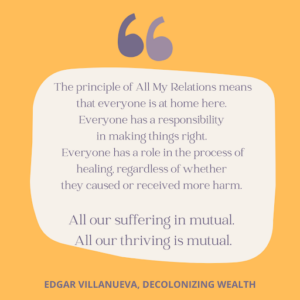Are you a Decolonizer?
October 8, 2022 2 Comments
In middle and high school, I challenged (and most likely annoyed) my teachers around this time of the year. I went to school in Plymouth, MA and wondered out loud why Native Americans would want to celebrate Columbus Day. “Shouldn’t it be a day of mourning for them?” I’d ask. I don’t recall any teacher having a good answer to my question or even being willing to engage in meaningful dialogue. I’ve always been a little proud of myself for having some level of consciousness at that age. And, I’m well aware that there is so much more to learn and to do.
Indigenous People’s Day isn’t just another three-day weekend. It’s a great opportunity to honor Indigenous people and to recognize and grieve the genocide and land theft that is at the heart of the founding of this nation. It’s a day to tell a more truthful story about the founding of this nation: the story of how the land that is now the U.S., which became the basis for wealth and well-being for the original settlers and their descendents, was stolen, swindled or taken by force. We Shall Remain and Unnatural Causes Episode 4: Bad Sugar provide powerful reminders of that history and connections to present-day conditions. Honestly, the more I learn, the more I feel regret, shame, and powerlessness to redress the wrongs. After all these years, I am still looking for ways to be an effective ally to Native American communities and to leverage the considerable privilege that being a U.S. citizen affords me.
Indigenous People’s Day is also an important opportunity to learn what Indigenous communities are doing in the present day and what it means to decolonize. It’s an opportunity to live into solidarity. For me, one powerful step in that direction has been learning from and participating in small ways in the Decolonizing Wealth Project, from which I borrowed the title of this post. The project asks:
“Are you a decolonizer?”
“Are you fighting for a more just and sustainable world? Are your efforts to bring about change rooted in a deep love for humanity and the earth?”
My response? Yes, I am fighting for a more just and sustainable world. Yes, my efforts to make change are rooted in a deep love for humanity and the earth. And yes, I have a long, long way to go to call myself a decolonizer.
In 2019 and early 2020, my colleague Eugenia Acuna and I had the privilege of working with Edgar Villanueva and the Decolonizing Wealth Project to help develop some of the project’s tools and resources. Since then, I have been diving more deeply into Edgar’s work (Decolonizing Wealth: Indigenous Wisdom to Heal Divides and Restore Balance is now in its second printing!) and taking baby steps toward using money as medicine to heal what’s broken in our world. I got my decolonizer t-shirt (You should get yours too! Proceeds support organizations working with Native-led organizations working on racial justice.), though I still feel like I have more to do before I can actually wear it.
This year I’m revisiting Edgar’s seven steps to healing and challenging myself to apply them more consciously and consistently in my practice and my life. The steps are so straightforward. They are simple to state and oh, so challenging to do. (No spoilers here! Get the book and find out what the steps are.) As I reviewed them recently, I realized how often I skip past some of the steps and sometimes even practice their exact opposite. I invite you to join me in digging deeper, reflecting more honestly, loving harder, and practicing grace with oneself and with others more often. How will you open yourself to being guided by Indigenous wisdom as we seek to heal divides and restore balance?



2 Comments
Thank you for this witness and reminder, Cynthia.
Thanks Stewart! I find the annual reminders are important as a touch stone. It’s so easy for me to drift.